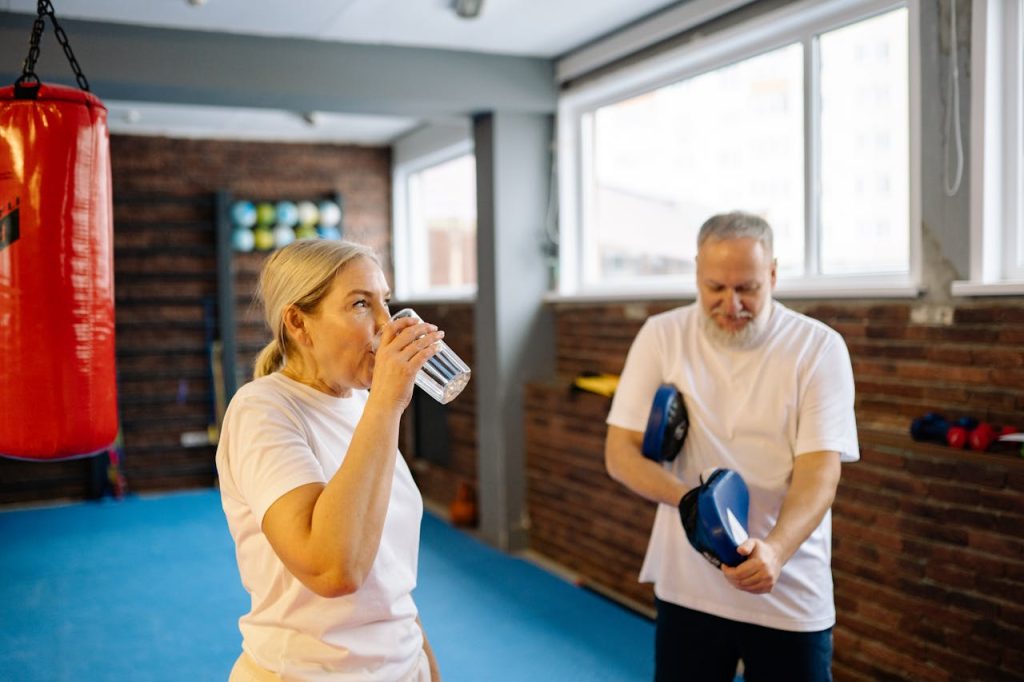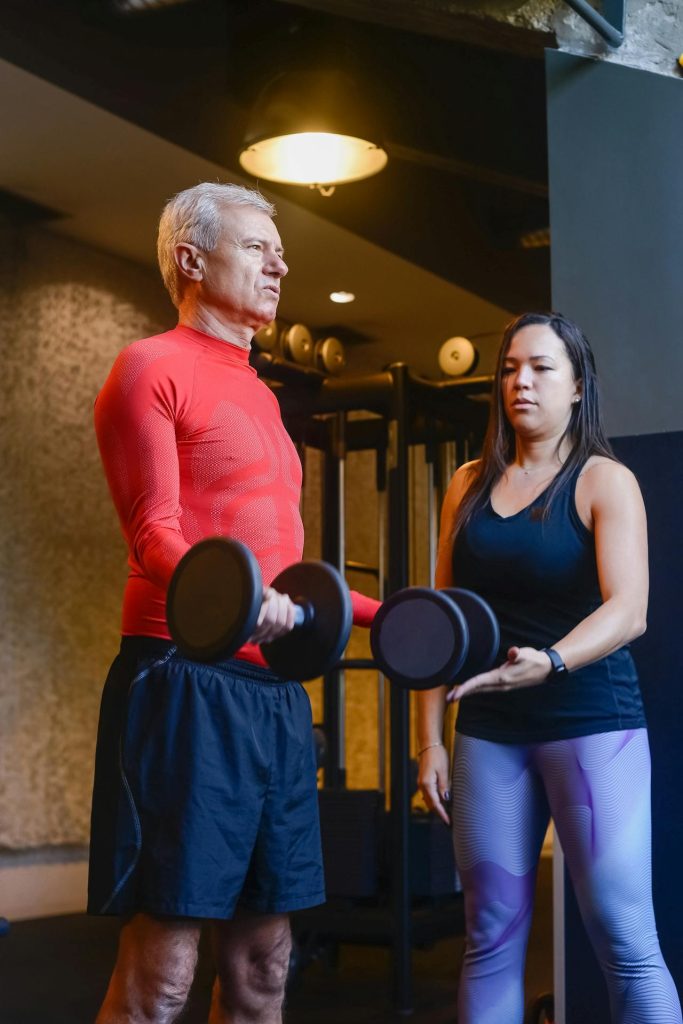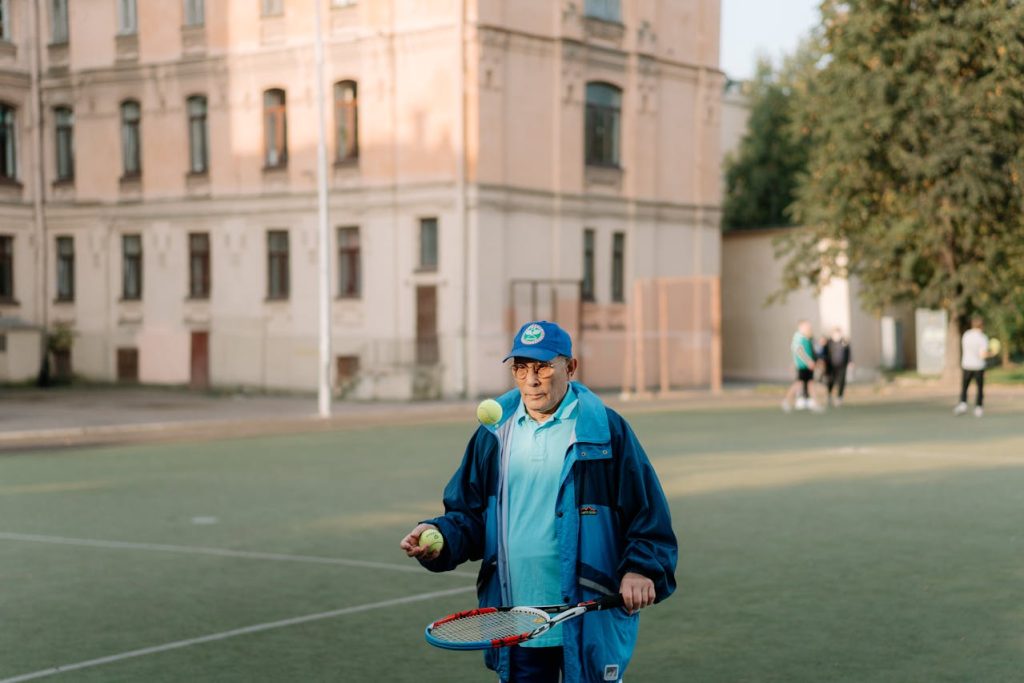To craft an effective daily routine for aging well, you need habits that work with your body and mind as you age. Maintaining a consistent sleep schedule, consuming plant-based meals, and incorporating daily movement benefit your energy & mood. Easy fixes — like drinking more water and carving out naps — can eliminate minor pains and enhance concentration. Constructing a daily regimen that combines social activities, hobbies, and self-care keeps you cognitively nimble and optimistic. With daily routines that suit your lifestyle, you can age well and stay strong through it all. The upcoming chapters will dissect simple steps you can sprinkle throughout your day to age well.
Key Takeaways
- Establishing a consistent daily routine can help you improve both your physical health and emotional well-being as you age.
- Packing your day with brain workouts, exercise, and socializing helps promote mental acuity, physical health, and emotional balance.
- By planning balanced meals, setting sleep routines, and using reminders or digital tools, you can ensure you maintain energy, nutrition, and rest.
- Tailor your routines to your individual health needs and preferences, and remain flexible to adapt them as your situation evolves.
- Be flexible, give yourself free time, and accept that some days will be loose and low productivity.
- Tune in to your body’s cries, rest when necessary, and accept fellow caregiver/family support to get back on your feet!

The Power Of Predictability
A meaningful routine provides you with a solid foundation as you grow older. By surrounding that with a predictable daily schedule, you nourish your body and mind, which is essential for successful aging. This framework makes you feel secure, less anxious, and more empowered, allowing independent older adults to flow through their days with greater assurance and optimal health.
Mental Clarity
Staying mentally engaged is crucial to aging successfully. Daily, you can hone your brain with easy mental workouts. Book reading, puzzle solving, or even vocabulary — all keep your brain buff.
Mindfulness is another aid. With brief meditation or deep breathing, you can declutter your mind and reduce stress. This gets you out of the future and curbs runaway worrying.
Being in touch counts. When you chat with buddies or participate in group chats, you keep your mind occupied and stave off isolation.
Physical Stability
Daily exercise aids balance, strength, and fluid motion. Even gentle motion matters. Light stretching, chair yoga, or walking keeps you from getting hurt and increases your flexibility.
Attempt to squeeze in brisk walks or low-impact exercises. These increase your heart rate, assist with endurance, and enhance energy utilization.
See how you feel in the aftermath of each. Tweak your workouts to align with what your body really needs, so you keep safe and keep moving.
Emotional Well-being
Deep relationships render every day sweeter. Go out and meet friends, or join online groups – or just get involved in local activities. These bonds create community.
Sprinkle in hobbies or volunteer time. These activities provide you with meaning, making your days more satisfying.
Maintain a gratitude list. Every day, make a note of something you appreciate. This aids you in concentrating on the positives, constructing emotional resilience.
Journaling can help you sort thoughts and feelings. It provides you with a private mechanism for reflection and self-discovery.
Designing Your Daily Blueprint
Your morning routine for aging well can form your habits, steady body, mind, and spirit. A meaningful routine blends activity, nutrition, cognitive work, rest, and contemplation. A good daily schedule ensures you stay on top of health requirements while keeping every day significant.
1. Physical Foundation
Design your day for movement that suits you. Walk, swim, or cycle for a minimum of 30 minutes to get your heart going. Supplement with bodyweight moves or resistance bands, two to three times a week, to maintain muscle health. Stretch every morning to keep your joints loose. A few folks enjoy group sessions, which provide both workout and camaraderie–yoga classes or dance gatherings, for example.
Get regular screenings with your health provider. This provides you with a solid foundation to understand what to monitor or modify as you grow older. Maintain a repertoire of beloved activities: gardening, nature hikes, or silly time with the dog — to keep your schedule spicy.
2. Cognitive Fuel
Schedule your meals with your brain in mind. Begin breakfast with protein, healthy fat, and slow carbs—think eggs, avocado, and whole-grain toast. Eat lighter as the day progresses and end dinner earlier. Sprinkle in some fruit/leafy greens/seeds for brain power.
Schedule snack breaks with nuts or yogurt to maintain energy. Drink water frequently—dehydration can bog down your brain and leave you feeling cloudy. Experiment with a new skill, read, or puzzles to keep your brain sharp.
3. Emotional Balance
Give yourself calm. Whether it’s reading, music, or a quick stroll outdoors. Sunshine-in-your-face kickstarts your mood and focus by giving you some natural light first thing in the morning. Discuss how you feel with family or friends. Join a faith group or community event–studies tie these to living longer.
Attempt light stress remedies such as yoga or tai chi. Emotional check-ins can help you course-correct your plans if you’re feeling off.
4. Restorative Sleep
To bed and up at the same time. A 30–60 minute wind-down routine — think reading or some gentle stretches — lets your body know it’s time for sleep. Keep your bedroom cool—between 15–19°C—and dim. Steer clear of caffeine or heavy meals near bedtime.
Others dub themselves “professional sleepers,” to recast sleep as a craft worth honing.
5. Personalization
Craft your morning routine for yourself. Collaborate with professional caregivers or family members to create meaningful activities that fit your needs. Pay heed to your own feedback and adjust daily schedules as life varies.
Beyond The Checklist: Embracing Flexibility
A routine can help you feel steady and in control, but strict schedules sometimes miss what matters most: your well-being and joy. Flexibility in your daily plan isn’t about abandoning structure; it’s about making room for real life. Embrace flexibility — Adapt to changes, experiment, and be compassionate with yourself, which will help you age well, feeling more grounded and fulfilled every day.
Benefits of embracing flexibility in your daily routine:
- De-stresses by diminishing the impulse to fulfill impractical objectives
- Opens the door to new experiences, keeping life interesting
- Makes it easier to manage unexpected changes and setbacks
- Supports better mental and physical health by encouraging rest
- Helps you find purpose and joy in daily life
Intentional Spontaneity
Spur-of-the-moment moments can paint your day with additional vibrancy and significance. Allow time each week for something new, whether it’s a community walk or a new recipe. Maybe you take a walk in a local park or sign up for an online class that piques your interest. These activities interrupt boredom and might assist you in making new friends.
Impromptu trips or activities in your community can provide a sense of unity, particularly if you reside alone or are separated from your family. Even small shifts, such as turning off on an alternate path during your walk or adding a new book to your rotation, can invigorate the mind. Stepping off the well-worn path, even momentarily, can inspire delight and make you feel more alive.
The “Good Enough” Day
There will be days you won’t complete every task, and that’s okay. Embracing this acceptance de-stresses and grounds you where it counts. Rather than a hundred-item checklist, shoot for a handful of small victories—perhaps you make a meal, phone a friend, or stretch for five minutes. Every step matters.
Enjoy what you accomplish, not what you overlook. This good habit breeds confidence and makes every day feel significant. Even less structured, you can still find fulfillment and peace.
Listening To Your Body
Listen to how you feel throughout the day. If you see low energy, choose lighter activities or take a nap. Flexibility workouts — think light stretches or simple yoga — maintain your joints’ health and assist with everyday activities.
Short breaks for movement or quiet time — reading, meditation — are key. These habits can elevate your mood, help you sleep, and indicate when your body needs to rest. Stay in contact with caregivers or loved ones regarding any changes in your feelings, both physically and mentally.
A Sample Day’s Flow
A daily flow injects a rhythm into your day, allowing you to feel calm and on top of things. For most folks, this sort of skeleton helps to stay sane and maintain healthy habits! A pictorial chart helps you see your day at a glance, so you don’t lose time. Indeed, it requires effort to establish, but it changes how you feel, both mentally and physically. You can mold your schedule around what’s important to you, and even little decisions—such as when to enjoy a cup of tea or go for a walk—render your day feel more your own.
Here’s a sample day to illustrate how you can flow your day towards aging well. This table serves merely as a guide. Feel free to interchange times or activities.
| Time | Activity |
| 07:00–07:30 | Wake up & gentle stretch |
| 07:30–08:00 | Breakfast (same time daily) |
| 08:00–09:00 | Short walk or light exercise |
| 09:00–10:00 | Cognitive tasks (reading, puzzles) |
| 10:00–10:15 | Hydration break (water) |
| 10:15–12:00 | Personal projects or hobbies |
| 12:00–12:30 | Lunch (consistent time) |
| 12:30–13:30 | Rest or relaxation (music, meditation) |
| 13:30–15:00 | Social interaction (call, chat, group activity) |
| 15:00–15:15 | Hydration break (water) |
| 15:15–17:00 | Outdoor time or light chores |
| 17:00–18:00 | Free time/reflection/journaling |
| 18:00–18:30 | Dinner |
| 18:30–20:00 | Relaxation (TV, family time) |
| 20:00–21:00 | Prepare for bed (reading, stretching) |
Fixed mealtimes allow you to monitor nutrition and medications. Make an effort to drink water at regular intervals throughout the day. Most adults do well with about 2–3 liters of total fluids daily (including water, other beverages, and the water naturally found in foods), but your individual needs can vary depending on your health, medications, and activity level. Check with your health provider if you’re unsure what’s right for you.. Slot in some movement, even if it’s just a walk around the block or some stretches to keep your joints loose. 1: Block out time for your mind — reading, puzzles, or learning something new can keep you sharp. Social time remains just as key, be it a call with a friend or sharing a meal. Soulful space for silence, allowing you to ponder or simply exhale.
It takes time and patience to stick to this kind of plan, so begin with one or two things—perhaps a fixed breakfast time, or a daily walk. Once you become accustomed to the flow, you can include additional components. Flexibility is key; tweak the plan as your needs evolve.

Modern Tools For Consistency
Today’s tools can do a lot to help you keep up with a meaningful routine to age well. With apps or calendars on your phone or computer, you can schedule simple reminders for meals, exercise, hydration, or even downtime. These keep you on track and ensure you don’t forget what counts. For others, creating distinct morning and evening schedules in a daily schedule prevents confusion and provides a defined beginning and ending to each day. You can use task lists and mobile apps to break large jobs into tiny steps that integrate into your life, which can reduce stress and let you accomplish more with less uncertainty.
Wearables, such as fitness trackers or smartwatches, aren’t just counting your steps. They can nudge you to move if you’ve sat too long, show your heart rate, or even track your sleep. These tools assist in providing insight into your progress and identifying trends you might otherwise overlook. They’re great for keeping you moving and can enhance your mood, sleep, and energy as you maintain your schedule. Nothing like watching your activity increase or sleep quality improve over time to fill you with pride and keep you motivated. These gadgets typically pair with smartphone apps that enable you to set goals, share accomplishments, or receive tips from professionals.
Meal planning becomes simpler with online services that assist you in selecting meals, constructing shopping lists, and even arranging for the delivery of necessary items. A lot of these meal apps organize recipes based on prep time, dietary restrictions, or what’s in your kitchen. They assist you in sampling new foods and maintaining healthy meals, which supports successful aging. This can reduce last-minute stress and ensure you eat well every day. Some readers use these tools to schedule meals with family or friends, adding an element of fun and support.
Your family and friends can assist you in utilizing these tools as well. Certain applications allow you to share routines or updates, allowing loved ones to check in or provide a brief message of encouragement. This way, it’s less lonely and keeps everyone in tune. Having others on board makes you feel like part of a team, engenders trust, and can enrich your everyday life.
Overcoming Common Hurdles
We all encounter the same stumbling blocks when working to establish a morning routine that encourages healthy aging for seniors. Tiredness, laziness, and even an anxiety to take on a new challenge can bog you down. These hurdles are typical. It’s so easy to tell yourself you’re too tired or busy, or get caught up in grand schemes that are difficult to maintain. Attempting to overhaul too much too soon is among the most frequent errors. It can leave you burned out before you even get results.
Begin with manageable chunks in your daily schedules. Establish easy, daily goals. For instance, to take a walk not for an hour, but for five or ten minutes. Whether it’s another glass of water or a few extra minutes of stretching in the morning, it’s a modification you can make without much distress. Dealing with small parts of a task makes it seem less overwhelming. With every small success, you gain confidence and form habits that endure.
Stay tuned. Working out with someone can help you stick with it. If you’re going to work out, recruit a friend or family member. This keeps you honest and less likely to blow off a session. If you’re beginning a new exercise, be sure to learn the proper form. Good form keeps you from getting hurt and makes you feel more secure as you gain strength. Open discussion of what you struggle with, either one-on-one or in a group, can help you receive advice and encouragement.
Hang in there. New habits take weeks, even months, to feel natural. If you miss a day, don’t give up! Give it another shot the following day. Discover what brings you joy – new hobbies, time outdoors. Even minor shifts, such as a consistent bedtime or a one-minute stroll between errands, accumulate. A dissatisfying old problem that we all must overcome. With consistent strides and some patience, you can establish behaviors to assist you in successful aging.
Conclusion
Your daily plan determines how you age. A routine establishes a resilient foundation for your body and mind. Tiny things, like a morning walk, or a designated meal time, or a quiet moment — they can all make the difference between fading and flourishing. Things like basic checklists or phone alerts keep you on track. Hurdles pop up — travel, crazy days, or low energy. Trade tasks or switch the order to suit your needs. Maintain stability, but allow for flexibility. Every day is an opportunity to nurture yourself. Begin with something that suits your lifestyle. Share your wins/tips with others. Your journey to age well can begin today, and every little step counts.

Frequently Asked Questions
1. Why Is Having A Daily Routine Important For Aging Well?
A daily routine promotes a flexible schedule that reduces stress and encourages healthy habits, contributing to successful aging and life satisfaction as you age.
2. How Do I Start Designing A Daily Routine For Healthy Aging?
Start with your priorities, such as exercise, meals, and sleep, which are essential for a meaningful routine. Then, regularize them by scheduling these daily activities at the same time each day for successful aging. Tweak as necessary!
3. Can I Change My Routine If Something Unexpected Happens?
Yes, agility is fundamental for seniors. Modify your morning routine when necessary, but strive to return to your daily schedules for grounding and sustenance.
4. What Are Some Tools That Can Help Me Stick To My Routine?
You can use smartphone apps, alarms, or calendars to support a meaningful routine for seniors.
5. What Do I Do If I Miss A Day In My Routine?
Skipping a day in your morning routine is okay; simply begin again the following day. The key to successful aging is not about perfection but about progress.
6. How Much Physical Activity Should I Include In My Daily Routine?
Strive for a minimum of 30 minutes of moderate activity, such as walking or stretching, on most days to enhance your morning routine for successful aging. Tweak this according to your health and capability.
7. How Can I Make My Daily Routine More Enjoyable?
Fill your morning routine with meaningful activities you love, connect with, and celebrate victories both big and small, ensuring a fulfilling day for seniors.
Start Your Journey To A Vibrant Retirement With Fitness Ellipsis!
Are you ready to enjoy your golden years with more energy, confidence, and a sense of purpose? At Fitness Ellipsis, we know that healthy aging isn’t just about exercise or diet—it’s about creating a balanced lifestyle that supports your body, mind, and spirit.
Our Lifestyle Coaching for Retirees is designed with your needs in mind. With personalized guidance, supportive coaching, and strategies tailored to your stage of life, we’ll help you build routines that enhance mobility, reduce stress, and strengthen overall well-being. Whether you want to stay active, improve daily habits, or rediscover motivation, our compassionate team is here to support you every step of the way.
Through customized nutrition advice, age-appropriate movement plans, stress management techniques, and ongoing encouragement, we’ll help you feel vibrant, independent, and in control of your health. This isn’t just about longevity—it’s about enjoying a fulfilling, energized retirement.Don’t wait to invest in your well-being. Join the Fitness Ellipsis family today and take the first step toward a healthier, more empowered life in retirement. Contact us now to learn how our lifestyle coaching program can help you thrive today, tomorrow, and for years to come.
Disclaimer:
This article is for informational and educational purposes only and is not intended as medical advice, diagnosis, or treatment. Nutritional needs vary by individual, especially for older adults or those with chronic health conditions. Always consult with a qualified healthcare professional or registered dietitian before making significant changes to your diet or protein intake.




